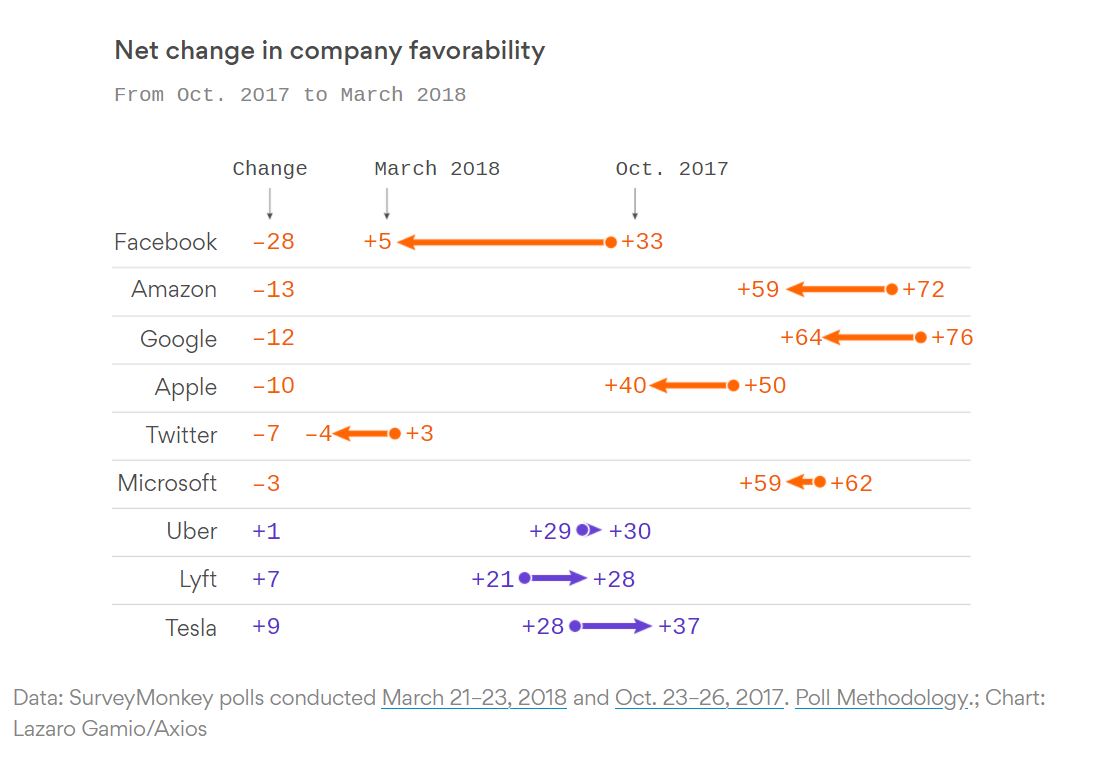The technology sector – particularly that of Silicon Valley – has been under fire in the last year or so. We’ve seen it through Uber’s toxic culture and glib attitude about geotracking customers even when they weren’t using the app (among other things), Twitter and Facebook enabling of bots and trolls under foreign control, Amazon’s desire to dominate nearly every industry, weekly data breaches, and more. The industry is in the midst of a trust deficit among the public.
Facebook’s Opportunity to Lead
When the news broke about the exploitation of a known loophole in Facebook’s user data, there was an outcry in the media. And it’s important to acknowledge that the media hasn’t gotten everything quite right. But when The Guardian’s lead story on Facebook and Cambridge Analytica broke, Facebook flubbed the very first rule of crisis communications: say something.
Crisis is the true test of character. And because an organization’s character is expressed through its leaders, that means it’s also the true test of leadership. When given the chance to lead, Facebook’s leadership hid. For five days.
CEO Mark Zuckerberg and COO Sheryl Sandberg, three days into the crisis, did not lead or even attend an employee all-hands meeting. The deputy general counsel of Facebook led that meeting. And that symbolic gesture shows what Facebook is really concerned about: the legal ramifications of what happens next. More on that below. First, let’s address the other ways Facebook flubbed it’s chance to lead in this situation.
It took five days before Zuckerberg made any media appearances, and then it was a blitz. But when he did address the issue, he waffled back and forth between being defensive and somewhat apologetic. In times of crisis, we need definitive leadership that makes the following positions clear:
- We screwed up and we’re sorry.
- We’ve stopped doing what caused the issue.
- We’ve taken these steps to ensure the safety and security of our customers.
- We’re committed to this never happening again.
In short, it takes a leader with a strong moral compass, good communication skills, and a backbone. And that was lacking all around. As luck would have it, the latest episode of our podcast The Difference addressed these very principles – and this was recorded weeks ago.
Your Business Priorities Are Showing
“What you are shouts so loudly in my ears I cannot hear what you say.” — Ralph Waldo Emerson
When companies approach crises, it may appear to be a public relations problem, but nearly every one of them is at its core a business problem. There are policies that need to change or a specific set of business processes the require updating. The words that the communications and marketing teams put to the crisis can’t be empty promises; they need to echo exactly what the business is doing to correct and address the problem.
What we’ve seen from Facebook will make your head spin:
- Facebook is currently funding a campaign to block a California data privacy measure;
- But is shutting down third-party ad targeting;
- The company is hiring 11 lobbyists in Washington, DC;
- But says regulation is not a question of ‘if’ but ‘what type’;
- Zuckerberg is trying to avoid appearing before British Parliament to testify;
- But will testify before Congress
Will the real Facebook please stand up?
From FUD to CAB
In times of uncertainty, humans need reassurance. Even if none of this has been done before, we need to know that someone in a position of leadership has a plan. It doesn’t matter if you’re Mark Zuckerberg, Henry Ford, or Elon Musk; people expect answers when confronted with doubts and fears.
One would argue that if you’ve created something that has exceeded your expectations or affected humanity on a large scale, as a leader you have the moral responsibility to address societal issues. The FUD (fear, uncertainty, doubt) that your customers, employees, shareholders and others hold needs to be turned into CAB (confidence, assurance, belief).
And that comes from steady, mature leadership that is prepared to stand up for something and take the necessary responsibility and steps to ensure that they’re not doing harm.








Leave a comment